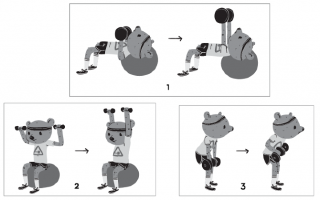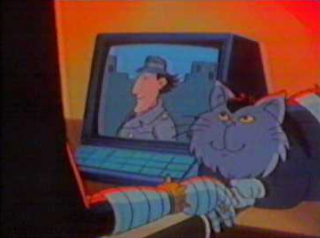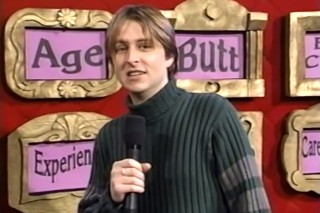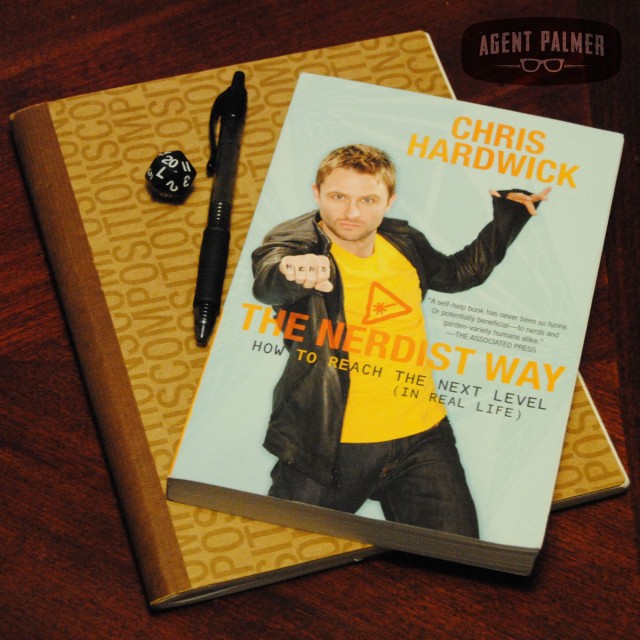
We can all use a little help. Sometimes from our friends, sometimes from ourselves. Whether or not we admit to needing help, to others or to ourselves, will make it all the more apparent that we need it.
For nerds, self-help books are everywhere, because learning comes from everywhere – from video games, from that tabletop dungeon crawl from eight years ago, or from the many experiences in between. A good self-help book for nerds is a bit like the Highlander: “There can be only one.” That one is The Nerdist Way: How to Reach the Next Level (In Real Life) by the Nerdist himself, Chris Hardwick.
Nerd guru Hardwick doesn’t pull any punches as he generalizes what he’s learned from himself and his interaction with other people and fellow nerds. In fact, I was convinced he knew what he was talking about when I read the following sentences early on in the book, “Having been socially ostracized since early childhood, most Nerds are very comfortable with rejection. Not that we love it or anything, it’s just that it’s familiar.”
He had me at “socially ostracized.”
The book is set up into three main sections; Mind, Body, and Time. Each is important, but it’s not necessary to read this book from start to finish, as I did. I think, you can pick this book up and read the section you need to when things arise. I will say, however, that the section on Anxiety would be a great thing to always keep in your Bag of Holding.
In the Mind section, Hardwick talks of the importance of Mind control, the kind that focuses on putting you in control of your own mind. Think of it as tips to Jedi Mind Tricking yourself. Some of the great little tidbits, aside from “The Nerd mind is a powerful and complex machine,” which seemed important enough that I noted them were:
- “No human ever became interesting by not failing.”
- “Be the warden, not the prisoner.”
- “The reality you experience is almost wholly shaped by your perception of it. YOU HAVE THE POWER TO CHOOSE WHAT YOU NOTICE.”
- “Strive for excellence in something you love.”
- “Shape your reality. Don’t be a pawn for the darkness.”
Hardwick even goes so far as to warn of us the potential pitfalls of success! “Beware! Because Nerds tend to experience rejections from a young age, they tend to skew a little on the crazy side when they finally achieve success and power. Go easy on the little-brains.”
The Body section is full of exercise cartoons and ways to better yourself, because once you’ve got your mind right, why not get your body right? But this part of the book isn’t just dedicated to exercise and eating healthy, it’s also about change.
First and foremost, Hardwick explained the “standard binary slouch.” If you’re not familiar, here’s his explanation, “…years and years of sitting at computers or in front of video games have created the standard binary slouch. In other words, any device that has a binary-based system will almost always make you hunch over to interface with it.” It seems so obvious, but we’re all guilty of it. Two of the most important things in the body section seem more global to the self-help cause than to just getting your body right.
Hardwick says, “…I take umbrage with the concept of ‘being content with oneself.’ It’s bullshit. You should be HAPPY with yourself. Contentment is a sedentary state.” How could you not agree with this?
The other comes from Hardwick, the man who has applied his nerdisms to his real life more than most. “We love to talk about the butterfly effect in terms of time-travel movies: ‘If you change even the SMALLEST of things in a system, its long-term effects can be dramatic.’ Why can’t the same be true for lifestyle changes?” He’s talking about it in the Body section, because taking the stairs everyday, or one less candy bar, cup of coffee, etc., can make a difference. We just don’t see it that way, unless it’s in the movies or ends in total catastrophe (like in the movies!)
The third section on time is, quite possibly, the most fun to read. That’s not just because I found out that Mr. Hardwick and I have some of the same design flaws, but because it is downright entertaining!
On general time management, Hardwick sites the concept of “Policing yourself is easy when you have a goal.” But the best part comes from his take on nerds and evil geniuses (or genii as he says).
“Nerds make great evil genii. An evil genius is nothing more than a Nerd with a tragic revenge story… Evil geniuses work their way up. They are not afraid to plan big and take chances that most of the populace would deem ‘maniacal.’ They also take setbacks as motivation and retooling opportunities. In their mind, failure is simply not an option.”
He also goes the other way when talking about saying no, explaining that “Nerds have comic-book-inspired ‘hero syndrome,’ where we want to swoop in to the rescue so people like us can then tell other people, ‘Hey, that dude/lady is RAAAAAAD!'”
One of my favorite lines in the book, and there are many, is from the section on saying no.
“…Sometimes I see red flags more as pretty decorations than as warnings that should be heeded.” This is something I have done too many times in my life to count!
Balance is also important as is diversity, because Hardwick says he believes “in today’s financial climate, it is IMPERATIVE to spin multiple plates. It’s actually RISKIER to only have one job…” The balance to that is, “the truth is, if you try too hard to be doing EVERYTHING, you don’t ever really focus on the most important thing, which should be the quality of your work.”
All of these are small pieces of larger stories, anecdotes, and wisdoms. Don’t assume because I layed out the Cliffs Notes that you have enough to go on. You don’t. Some of the stuff here is even a bit contradictory, but in full context, it all works well together.
A few other more generic pieces of wisdom from the book are:
- “Never forget that you yourself are a commodity.”
- “Information avoidance leaves you in this purgatory of inactivity because you’re too afraid of the unknown.”
- “JUST FUCKING DO IT. No more excuses. Every minute you’re not pursuing a creative passion in some capacity, be it hobby or career, you are wasting valuable time on this planet.”
- “Achieve, be grateful, move on,” or as he puts it shortly thereafter “It’s not about reaching a goal; it’s about what you become in the process.”
But most importantly, he states that “If the one thing that you take away from this book is that you cultivate the gift of being kind and respectful to yourself, your money will have been well spent.”
You may be thinking, why Chris Hardwick is just a host of things from podcasts to television, and hey, remember Singled Out? Well, he covers that himself, “Why share my failures and deeply personal issues with you? Because I want you to feel better.”
He also tells you what he is and isn’t. “I am not a professional therapist. I am just a guy who tends to get this delightful brand of brain jolts, so I am merely sharing what I have learned for myself through trial, error, countless hours of therapy, and autodidactic research.”
Chris wants to help. He wants you to “Enjoy your burrito,” which is a shorter way of saying “I think pursuing happiness is the wrong approach. That idea puts it into the future, and therefore the wrong tense. You just need to BE happy–in the present–with who you are and what you have,” because “there is no merit in toiling in a sadness dungeon.”
He knows because he has been there and done that. He knows that as Nerds, “It’s very easy to attack ourselves. Even comforting in its familiarity, but you must resist this urge at all costs.”
Is it groundbreaking? No. But it’s like sitting down with a friend who’s been there and can help in plain English without all the technical jargon or expensive bills. Plus, it comes with the added bonus of nerdy and geeky references!
Read the Secret File of technical information and quotes from The Nerdist Way.



